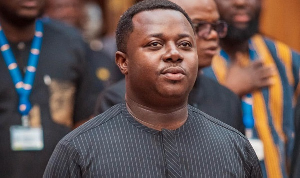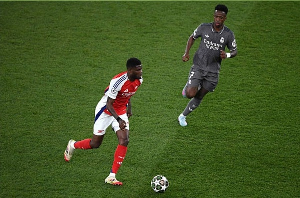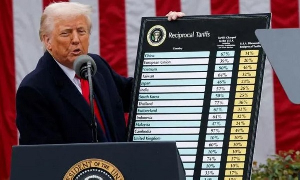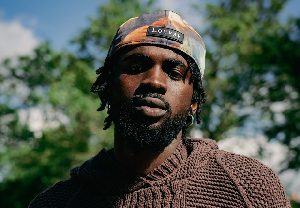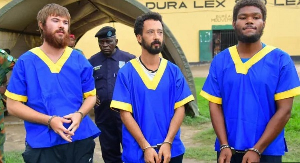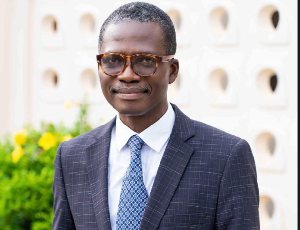By Kwame Okoampa-Ahoofe, Jr., Ph.D.
We have tangentially, and obliquely, crossed paths; and it was not an occasion during which I really wanted to have any trucking with the man. Interestingly, though, we both have a mutual friend who actually happens to be a senior schoolmate and a distant relative whom, in fact, I quite admire. The problem that I have with this “Busanga” guy, who even once attempted to arrange a meeting with me, through Dan Ofosu, our mutual friend, is that although the Rawlings and Atta-Mills hanger-on is a pathologically addled and schizophrenic character, not only does he not seem to appreciate this very serious fact, the man also finds it quite expedient to constantly and brazenly attempt to project his abject and crass ignorance onto his Ghanaweb.com audience (that is, those who, for any number of capricious reasons, perceive themselves to share “Comrade” Busanga’s confused ideology, whatever the latter may be, with him).
In a recent article titled “Anti-Asante Bombast or Asante Bombast” (4/8/09), an article that shamelessly attempted to apologize for flagrant Ewe anti-Akan nationalism, the writer, among other wild assertions, had the chutzpah to query his audience as follows: “What happened to our shared values and similarities that had anchored our society since independence and in our most trying times?
Perhaps some levelheaded and abrasively firm and forthright Ghanaian like me ought to point out to Comrade Busanga (a.k.a. William Antwi/Bafo) that as far as the Volta Ewe are concerned, Ghanaians have never shared any values whatsoever, be the latter one of either “similarities” or differences, as the case may be. And this largely explains why during the Acheampong junta, Prof. Kofi Awoonor, chief proponent of a separatist Ewe national identity, was able to mount a public platform on the Legon campus, of the University of Ghana, and boldly, proudly and caustically assert: “I am first and foremost an Ewe before a Ghanaian.”
It is also interesting to recall that just a couple of weeks ago, President John Evans Atta-Mills elevated Prof. Awoonor to the august status of Chairman of the Council of State. Short of acute dementia, about the only logical explanation that could be adduced for such gestural insolence is what most of us avid students of Fourth-Republican Ghanaian political culture have known all along – that Oguaa Kofi is absolutely a man without the salutary righteousness of his own conviction, who prefers to take instructions, or marching orders, on the cheap from the “One-Man, One-Toilet Philosopher” of the Ridge Castle. In due course, we intend to thoroughly and comprehensively let Ghanaians in on the ideological mindset of Prof. Awoonor, as unapologetically expounded in his peculiar version of Ghanaian history. And here, we must promise, beforehand, that we intend to let our thoughtful readers and audience reserve the final judgment.
But that, contrary to what Comrade Busanga would have his audience believe, Ewes and the rest of the Ghanaian citizenry do not have any shared values, besides our obvious humanity, of course, is eloquently riposted by the fact that on the eve of Ghana’s reassertion of her sovereignty from Britain, in 1956, the Ewe of the southern Volta basin voted overwhelmingly to forge a common cause and destiny with their kinsfolk in present-day Republic of Togo. The latter may also partly explain why in the lead-up to last December’s general election, Togbui Afede Asogli, a Yale University-educated economist and invested traditional chieftain, intemperately called on the Ministry of Interior to open the Aflao border, as well as others on Ghana’s eastern flank, to enable his kinsmen and women on the Togolese side to liberally cross into Ghana in order to exercise their franchise! Perhaps this is the kind of “shared values” and “similarities” that Comrade Busanga is talking about. If not, then the man may do himself a lot of good, and save himself further embarrassment, by promptly seeking both psychological and psychiatric examination.
You see, I had not initially intended to respond to Comrade Busanga’s tripe of an article, for the simple reason of preferring to tackle issues of pressing national moment. Fortunately or unfortunately, however, I also did not want to let the man get away with his high crimes and misdemeanors, as it were. An example of the former regards the fact that although Comrade Busanga may speak the English language reasonably well, still, the man has yet to make an effective and logically sound writer of himself. Read, for instance, the following passage in which the P/NDC kangaroo court specialist and judge unreservedly, albeit unintentionally, concurs with anti-Asante detractors: “For instance, I find it most ridiculous and absurd when all Asantes are ‘purposefully’ [quotation marks added] stigmatized as arrogant, corrupt, incompetent and irresponsible simply because we did have a sitting [sic] president who is an Asante and who happened to have supervised a [sic] most corrupt, arrogant, incompetent and irresponsible regime. On the flip side, why should all Ewes be mischaracterized as violent and callous simply because ex-President Rawlings – an Ewe – was once the leader of a group of army officers who took over the reigns [sic] of our government by way [of?] a bloody coup d’état? Wow! Do we live in a country where the real and/or perceived sins of our leaders are dramatically seen in terms of where they come from? Are the tribal ‘lineages’ of our leaders now more important than the personal beliefs and convictions they bring to the table?”
The real “Wow!” here, of course, is for Comrade Busanga to fatuously and hyperbolically claim that the Kufuor-led government of the New Patriotic Party (NPP) was the “most corrupt, insensitive, arrogant, incompetent and irresponsible regime,” without also logically, scholastically and objectively enumerating the number of Ghanaian Supreme Court judges abducted and summarily executed by President Kufuor and the NPP, on grounds of their ethnic origin; and also the number of missing people and bona fide Ghanaian citizens imprisoned without the fundamental right of access to judicial scrutiny. Indeed, if Comrade Busanga were possessed of a good conscience, this moral reprobate would also have listed the number of private and legally acquired landed property expropriated by the NPP government vis-à-vis the latter’s P/NDC predecessor-counterpart, including the officially assigned residence of former First Lady Fathia Nkrumah! To be certain, it is unconscionable self-proclaimed “Asantes” like Comrade Busanga who are squarely responsible for bona fide and civic-minded Asantes being maligned and “stigmatized as arrogant, corrupt, incompetent and irresponsible.”
As Prof. Mawuse Dake eloquently testifies in his book, Lamentations of a Patriot, the very corrupt tradition of gratuitously awarding ex-gratia largesse to outgoing government officials and party operatives was invented by Messrs. Rawlings, Atta-Mills and their P/NDC thuggocrats. I have also gone on record as having challenged any mentally balanced Ghanaian citizen to name a single countryman or woman who Mr. Rawlings can confidently claim to respect, besides his own mother and wife. I hereby, once again, throw the gauntlet at Comrade Busanga!
It is interesting to recall that in the lead-up to the heated contest between Nana Akufo-Addo and Alan Kyerematen for the NPP presidential nomination, Mr. William Antwi Busanga, a dyed-in-the-wool NDC operative, decided to conveniently throw his weight behind Mr. Kyerematen, a fellow “Asante” kinsman. Maybe that is the sort of “legitimate tribalism” that our “Green Book” social-democrat would have his fellow countrymen and women practice. Finally, it is a darn great shame and pity that Comrade Busanga does not appear to know the stark difference between a “TRIBE,” a loosely organized primitive band of people (savages, in fact!), and a “NATION,” a civilized and highly organized society with an efficiently administered centralized system of governance, such as pertained to pre-colonial Asante, Akyem and Brong (Bono), for a few ready examples.
And for those of our readers who, like Comrade Busanga, may not be aware of the following: “A ‘TRIBE,’ such as the term was used in Ancient Israel, refers to one of the seven (7) or eight (8) Akan familial clans, among them Aduana/Anona, Ayoko, Asakyiri, Asenee Asona, Agona, Ekuona and Biretuo. We shall, in due course, expatiate on the difference between a Nation and a Tribe.
*Kwame Okoampa-Ahoofe, Jr., Ph.D., is Associate Professor of English, Journalism and Creative Writing at Nassau Community College of the State University of New York, Garden City. He is the author of 20 books, including “Ghanaian Politics Today” (Atumpan Publications/lulu.com, 2008). E-mail: okoampaahoofe@aol.com. ###


